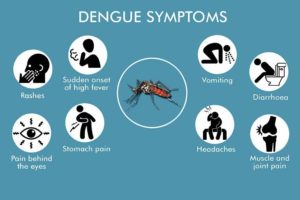By Matthias Samuel
 Dengue fever is a painful mosquito-borne tropical disease caused by the dengue virus. According to reports, 400 million dengue infections occur worldwide each year, with about 96 million resulting in illness. According to the WHO (world health organization), in Pakistan dengue fever has caused 16,580 confirmed cases and 257 deaths in Lahore and nearly 5000 cases and 60 deaths reported from the rest of the country.
Dengue fever is a painful mosquito-borne tropical disease caused by the dengue virus. According to reports, 400 million dengue infections occur worldwide each year, with about 96 million resulting in illness. According to the WHO (world health organization), in Pakistan dengue fever has caused 16,580 confirmed cases and 257 deaths in Lahore and nearly 5000 cases and 60 deaths reported from the rest of the country.
Symptoms of dengue fever
The symptoms of dengue fever start occurring between 4 to 7 days after the bite. Following are the symptoms which begin 4 to 7 days after infection and last for up to 10 days:
- Sudden, high fever
- Severe headaches
- Pain behind the eyes
- Severe joint and muscle pain
- Fatigue
- Nausea
- Vomiting
- Skin rash, which appears two to five days after the onset of fever
- Mild bleeding (such a nose bleed and bleeding gums)
Sometimes, symptoms are mild and can be mistaken for those of the flu or another viral infection. It is advised to see a doctor as soon as possible. So that the disease can be pointed out and treated in proper time.
Prevention of a dengue fever
There is actually no specific medicine to treat dengue. Taking painkillers are not of any help, it could only could worsen bleeding. There are some preventions that can be looked at to avoid dengue fever. Following are some preventions to protect yourself from a dengue fever:
- Use mosquito repellents, even indoors.
- When outdoors, wear long-sleeved shirts and long pants tucked into socks.
- When indoors, use air conditioning if available.
- Make sure window and door screens are secure and free of holes. If sleeping areas are not screened or air conditioned, use mosquito nets.
- Wear natural colored clothing (beige, light grey)
- Get rid of water containers around dwellings and ensure that doors and window screens work properly.
Matthias Samuel is a student of history in Quaid-i-Azam University (QAU) Islamabad, and occasionally writes blogs and articles.




